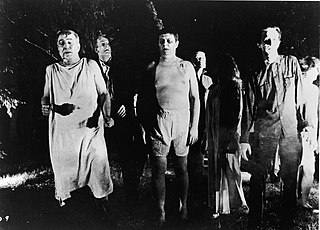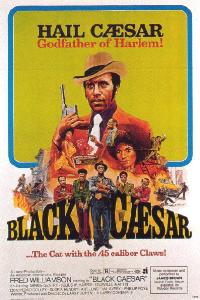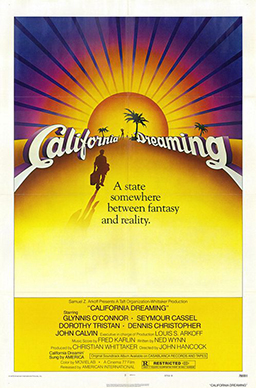Related Research Articles

Roger William Corman was an American film director, producer and actor. Known under various monikers such as "The Pope of Pop Cinema", "The Spiritual Godfather of the New Hollywood", and "The King of Cult", he was known as a trailblazer in the world of independent film.

A B movie, or B film, is a type of cheap, poorly made commercial motion picture. Originally, during the Golden Age of Hollywood, this term specifically referred to films meant to be shown as the lesser-known second half of a double feature, somewhat similar to B-sides in recorded music. However, the production of such films as "second features" in the United States largely declined by the end of the 1950s. This shift was due to the rise of commercial television, which prompted film studio B movie production departments to transition into television film production divisions. These divisions continued to create content similar to B movies, albeit in the form of low-budget films and series.
The decade of the 1980s in Western cinema saw the return of studio-driven pictures, coming from the filmmaker-driven New Hollywood era of the 1970s. The period was when the "high concept" picture was created by producer Don Simpson, where films were expected to be easily marketable and understandable. Therefore, they had short cinematic plots that could be summarized in one or two sentences. Since its implementation, this method has become the most popular formula for modern Hollywood blockbusters. At the same time in Eastern cinema, the Hong Kong film industry entered a boom period that significantly elevated its prominence in the international market.
American International Pictures LLC is an American film production company owned by Amazon MGM Studios. In its original operating period, AIP was an independent film production and distribution company known for producing and releasing films from 1955 until 1980, a year after its acquisition by Filmways in 1979.

The Fast and the Furious is a 1954 American crime drama B movie starring John Ireland and Dorothy Malone, co-directed by Ireland and Edward Sampson.

Samuel Zachary Arkoff was an American producer of B movies.
Free, White and 21 is a 1963 movie by self-proclaimed "schlockmeister" director Larry Buchanan. It was based on the true story of the controversial trial of a black man accused of raping a white woman in Dallas, Texas in the 1960s. The title is a version of the archaic American idiomatic phrase "free, white, and twenty-one", which means "beholden to no one".

The beach party film is an American film genre of feature films which were produced and released between 1963 and 1968, created by American International Pictures (AIP), beginning with their surprise hit, Beach Party, in July 1963. With this film, AIP is credited with creating the genre. In addition to the AIP films, several contributions to the genre were produced and released by major and independent studios alike. According to various sources, the genre comprises over 30 films, with the lower-budget AIP films being the most profitable.

Q – The Winged Serpent is a 1982 American monster horror film written, co-produced and directed by Larry Cohen and starring Michael Moriarty, Candy Clark, David Carradine and Richard Roundtree. The film follows a petty swindler (Moriarty) who accidentally intrudes in a case involving a winged deity monster that poses a threat to New York City. He is the only person who has information that can help the police to stop the creature.

Atlantic Entertainment Group was an independent film production and distribution company founded by Tom Coleman and Michael Rosenblatt in 1974.

Black Caesar is a 1973 American blaxploitation crime drama film written and directed by Larry Cohen and starring Fred Williamson, Gloria Hendry and Julius Harris. It features a musical score by James Brown, his first experience with writing music for film. A sequel titled Hell Up in Harlem was released in late 1973.

Sugar Hill is a 1974 American horror blaxploitation zombie film, directed by Paul Maslansky and starring Marki Bey as the title character who uses voodoo to get revenge on the people responsible for her boyfriend's death. It was released by American International Pictures. According to the film, the zombies are the preserved bodies of slaves brought to the United States from Guinea. AIP had previously combined the horror and blaxploitation genres with Blacula (1972) and its sequel Scream Blacula Scream (1973).
James Harvey Nicholson was an American film producer. He is best known as the co-founder, with Samuel Z. Arkoff, of American International Pictures.

Cinematic exhibition of the B movie, defined as a relatively low-cost genre film, has declined substantially from the early 1980s to the present. Spurred by the historic success of several big-budget movies with B-style themes beginning in the mid-1970s, the major Hollywood studios moved progressively into the production of A-grade films in genres that had long been low-budget territory. With the majors also adopting exploitation-derived methods of booking and marketing, B movies began to be squeezed out of the commercial arena. The advent of digital cinema in the new millennium appeared to open up new opportunities for the distribution of inexpensive genre movies.
Ted Rusoff was a Canadian voiceover artist, actor, vocal coach, and translator specializing in the adaptation and translation from and into various languages of synchronized dialogue for the dubbing of films and cartoons. Highly prolific with over 100 credits to his name, Rusoff is best remembered for his work adapting and performing English-language dialogue for countless Italian genre films.

California Dreaming is a 1979 American comedy-drama film starring Glynnis O'Connor, Dennis Christopher, Seymour Cassel and Tanya Roberts and directed by John D. Hancock.
New Concorde (NC) is an American Los Angeles, California based film distribution company founded by Roger Corman. NC got its start in 1983 when Corman formed the production and distribution Concorde-New Horizons (CNH) as one of the first production companies to develop and take advantage of video as a distribution tool.

Dragstrip Girl is a 1957 film starring John Ashley in his first lead role. American International Pictures released the film as a double feature with Rock All Night and it proved an early success for the studio.
Louis S. Arkoff is an American film producer; he is the son of executive producer Samuel Z. Arkoff and brother to film producer, Donna Arkoff Roth.
Manson International was an independent American film production company and distributor. The name was derived from the founders' surnames. Initially a distributor of foreign films, it became one of the pioneer film sales agencies in the country.
References
- 1 2 3 4 Goldstein, Patrick (June 5, 1982). "Low-Budget Formula for Movies: Movie: Low-Budget Formula". Los Angeles Times . p. E 1.
- 1 2 3 4 5 "At the Movies: 'Beach Party' man is producing films again, after a pause 'Beverly Hills Cop II' premiere in Britain Richard Gere explores brotherhood on a farm 105th movie for Lillian Gish New from Louis Malle Japanese festival, U.S. films Lawrence Van Gelder". The New York Times . October 2, 1987. p. C 8. Retrieved December 18, 2014.
- ↑ "Arkoff Tells Conventioneers Pix Still Need That Theatrical Push". Variety . June 10, 1987. p. 6.
- ↑ Broeske, Pat H. (16 June 1985). "Movies: Good taste no barrier to making profitable films on women in prison". Chicago Tribune . p. L 32. Archived from the original on December 18, 2014. Retrieved December 18, 2014.